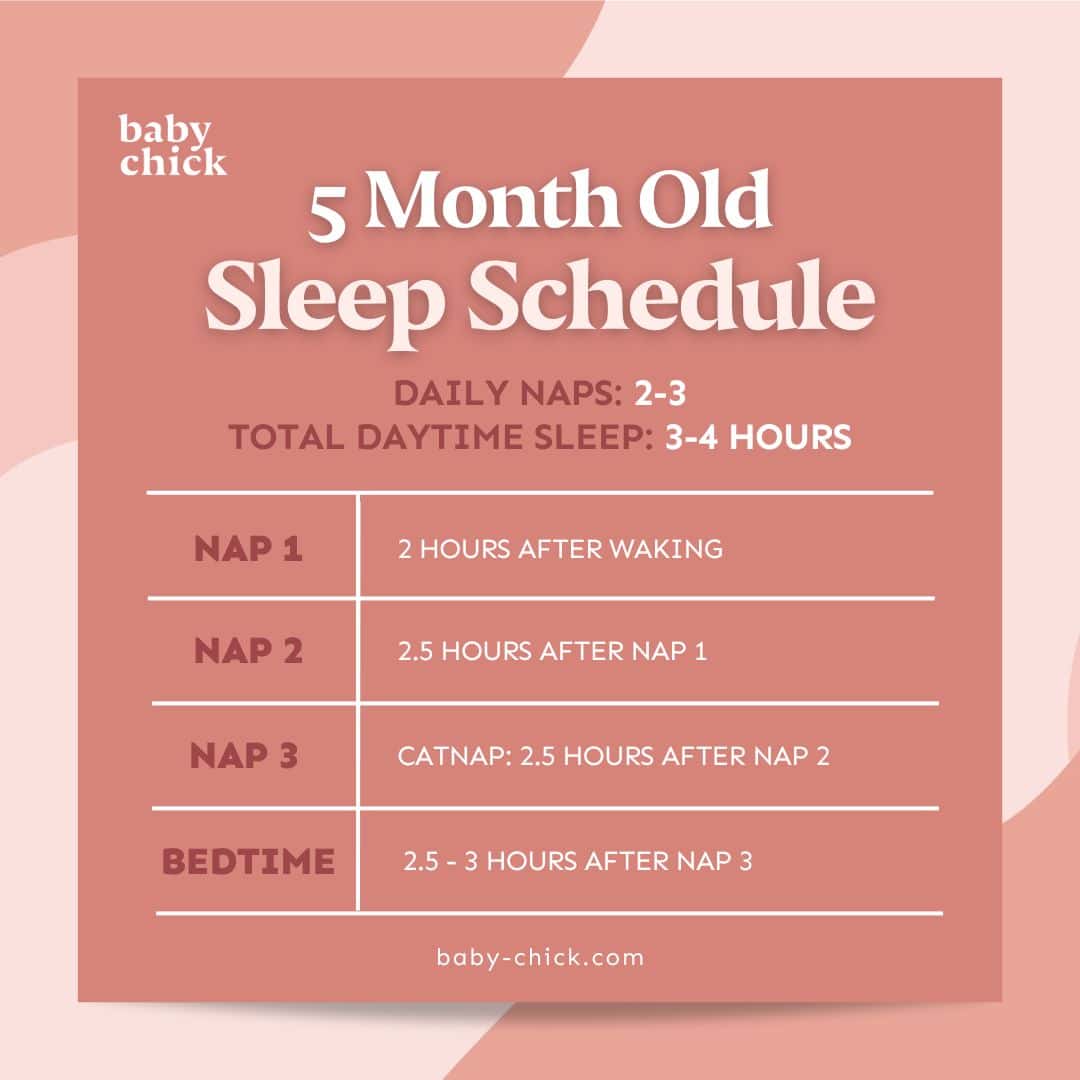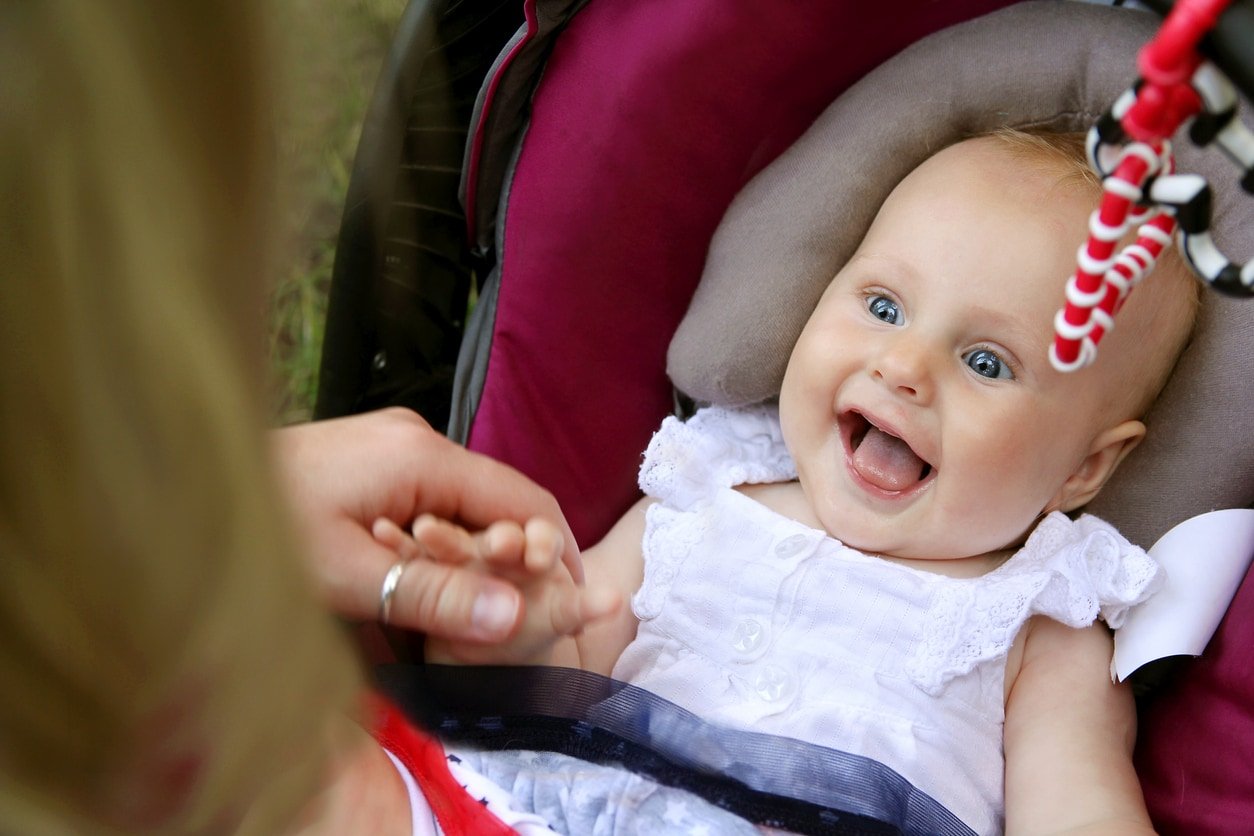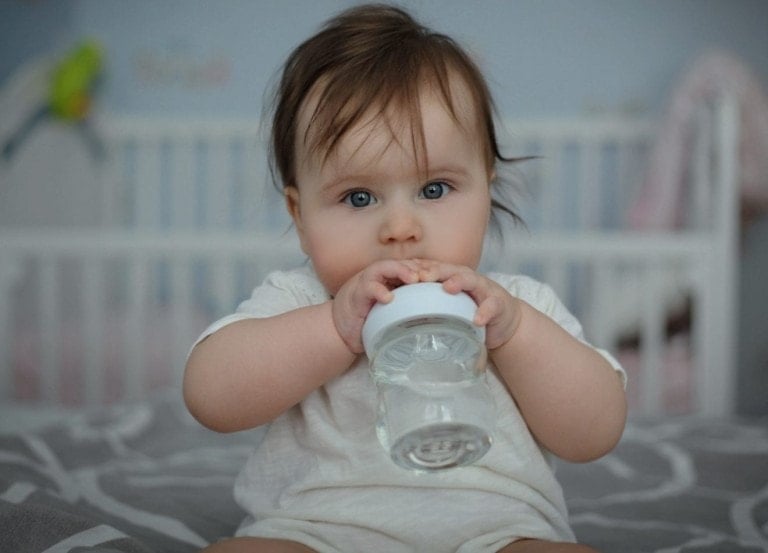The whirlwind adventure of your baby’s development continues to move forward at breakneck speed. Your 5-month-old baby is continuing to learn new skills, and their personality is truly starting to shine through. In this article, we will continue to explore the new developmental milestones they will achieve and how their feeding and sleeping schedules may change. We will also discuss any health concerns to be aware of and fun new activities you can do with your little one.
5-Month Developmental Milestones

Strap on your hats because the next month of your baby’s development is filled with more movement and sound than ever before. This month of milestones is also filled with more social growth for your 5-month-old when their personalities will start to shine. These new milestones include:1,2
- Rolling from their tummy to back
- Reaching for toys using both hands
- Using their whole hand to grasp a toy
- Finding toys hidden under blankets
- Sitting with support
- Making sounds to get your attention
- May hold out their arms to be held
- Recognizing familiar faces
- Showing displeasure when you leave their sight
5-Month Feeding Schedule
With all these new skills your baby is learning, their feeding schedule may also change. Most parents wonder when their babies can start eating baby food, and 5 months old is a great time to see if your little one is ready. Before starting solid foods, please consult your baby’s doctor to determine if they are ready. Some signs to look for that show your baby may be ready to try solid foods include:2
- Can they support their head and body while sitting or being held?
- Are they showing interest in your food, with actions such as grabbing for your food?
- If your baby shows these signs and your doctor has confirmed they are ready to start solid foods, it is best to start small. Start with small amounts of finely pureed single-ingredient foods, such as baby cereal or a single veggie puree.
It is important to remember that while your baby may be ready to start trying solid food, the bulk of their diet will still come from breast milk or formula. So, how much of this should a 5-month-old eat? Your baby should still have 3-5 ounces of breast milk or formula every two to four hours.10
5-Month-Old Sleep Schedule
As your baby enters their fifth month, their sleeping patterns will become more predictable. 5-month-old babies require 12-16 hours of sleep per day. At this age, your baby typically sleeps about three to four hours during the day, divided into two or three naps. Some babies continue to take shorter, more frequent naps. If you have concerns about your baby’s sleep, contact your pediatrician.2
Now is the perfect time to start if you have not started a bedtime routine with your little one. The best time to begin your routine is about 30 minutes before you are ready to put them down to sleep for the night. Your routine should consist of three to four quiet activities: feeding, bath time, storytime, and song time. You can start the bedtime routine with a feeding to help get your little one used to falling asleep without feeding first.4
Daily Schedule

Now that you have made it out of the newborn stage, a daily routine is possible and can be more easily maintained. Your 5-month-old’s feeding times will be much more consistent, and their wake times will be lengthened, allowing for more play time and outings. Consistent nap times will help you maintain structure in your baby’s day while ensuring your little one gets enough sleep.
It is recommended that a 5-month-old baby takes at least two naps, usually three, per day or sleeps for a total of three to four hours during the day. A sample schedule might look like a first nap around two hours after they have awoken for the day, lasting about one and a half to two hours. Then, once they wake, perhaps a feeding and some playtime can follow. A second nap might happen around two hours after waking from their morning nap and last another one and a half to two hours. Another feeding and some more playtime might follow that. You could aim for a bedtime of 7-8 p.m., so starting their bedtime routine around 6:30-7 p.m. can give your little one plenty of time to wind down for the night.4
Health Concerns to Watch Out For
Your baby will not have a standard well-child checkup at five months, as those typically happen at 4 and 6 months. Not having a well-child checkup makes some parents wonder if their baby is growing enough. On average, many babies at 5 months old double their birth weight. It is best to remember that not all babies grow at the same rate. This can happen due to family history, whether your baby has any underlying medical conditions, and how much they eat.5 Your baby may have more frequent doctor visits than is standard if their doctor needs to monitor their weight.
While there may not be a standard well-child checkup at 5 months old, you must be aware of some common illnesses your little one can catch. These include the following:6
- Colds with a runny nose, sneezing, congestion, cough, and fussiness
- Diarrhea and vomiting caused by a virus
- Ear infections
- Hand, foot, and mouth disease – Causing sores around or inside the mouth and typically a rash on the palms of their hands and soles of their feet
Most infants can overcome these common illnesses, but it is essential to seek medical help if your baby starts to show any of these symptoms:6
- A fever lasting longer than three days
- Ear pain
- Signs of dehydration, such as dry or cracked lips, decreased amount of wet diapers, and a decrease in tears
- Difficulty breathing
- Increased fussiness
- Decreased energy
Activities for 5-Month-Olds

Now that your baby is more active and mobile, their playtime will also become more active. Here are some activities you can do with your baby to help engage them with playtime and achieve their 5-month milestones:7,8
- Stack blocks and knock them down
- Have toys of a variety of shapes, sizes, and colors for your baby to choose from, feel, and look at
- Read books with simple pictures and faces
- Place a toy slightly out of reach to encourage them to move toward it
- Repeat any sounds they make and have a back-and-forth conversation with them
- Hide a toy under a blanket and encourage them to find it
- Help your baby learn cause and effect by giving them back the toys they have dropped
- Play peek-a-boo
Safety Tips
With more mobility comes an added need to ensure your baby remains safe in your home. Assessing your home and looking for ways your baby could become injured is important. Some things to keep in mind include:9
- Placing baby gates at the top and bottom of stairs. Read our baby-proofing checklist and see the top baby safety products for baby-proofing your home.
- Removing any small objects such as coins, balloons, or batteries from their reach
- Use the correct size car seat and ensure you’ve installed it correctly by ensuring the straps are at the correct height and it is facing backward
- Never leave them unattended, especially with young children or pets
- Using a slip-resistant tub for bathing and only filling it 2-3 inches with warm water
- Placing your baby on their back to sleep with no blankets, pillows, bumper pads, or toys in their crib
- Using a firm crib mattress with a snugly fit bottom sheet
- Removing all mobiles from their crib before leaving them unattended to sleep
Your little one’s adventure of growth and development is an exciting process to witness. As you move through this journey of new milestones and changing schedules, remember that every baby is unique and will reach these new milestones at a different pace. Cherish these moments, and savor the incredible bond you are building with your baby.
































